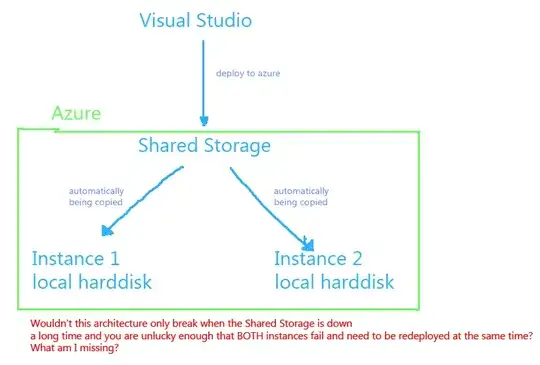I've had a few outages of 10 to 15 minutes, because apparently Microsoft had a 'blip' on their storages. They told me that it is because of a shared file system between the instances (making it a single point of failure?)
I didn't understand it and asked how file share is involved, because I would assume a really dumb stateless IIS app that communicates with SQL Azure for it's data.
I would assume the situation below:
This is their reply to my question (I didn't include the drawing)
The file shares are not necessarily for your web app to communicate to another resources but they are on our end where the app content resides on. That is what we meant when we suggested that about storage being unavailable on our file servers. The reason the restarts would be triggered for your app that is on both the instances is because the resources are shared, the underlying storage would be the same for both the instances. That’s the reason if it goes down on one, the other would also follow eventually. If you really want the availability of the app to be improved, you can always use a traffic manager. However, there is no guarantee that even with traffic manager in place, the app doesn’t go down but it improves overall availability of your app. Also we have recently rolled out an update to production that should take care of restarts caused by storage blips ideally, but for this feature to be kicked it you need to make sure that there is ample amount of memory needs to be available in the cases where this feature needs to kick in. We have couple of options that you can have set up in order to avoid any unexpected restarts of the app because of a storage blip on our end:
You can evaluate if you want to move to a bigger instance so that we might have enough memory for the overlap recycling feature to be kicked in.
If you don’t want to move to a bigger instance, you can always use local cache feature as outlined by us in our earlier email.
Because of the time differences the communication takes ages. Can anyone tell me what is wrong in my thinking?
The only thing that I think of is that when you've enabled two instances, they run on the same physical server. But that makes really little sense to me.
I have two instances one core, 1.75 GB memory.
